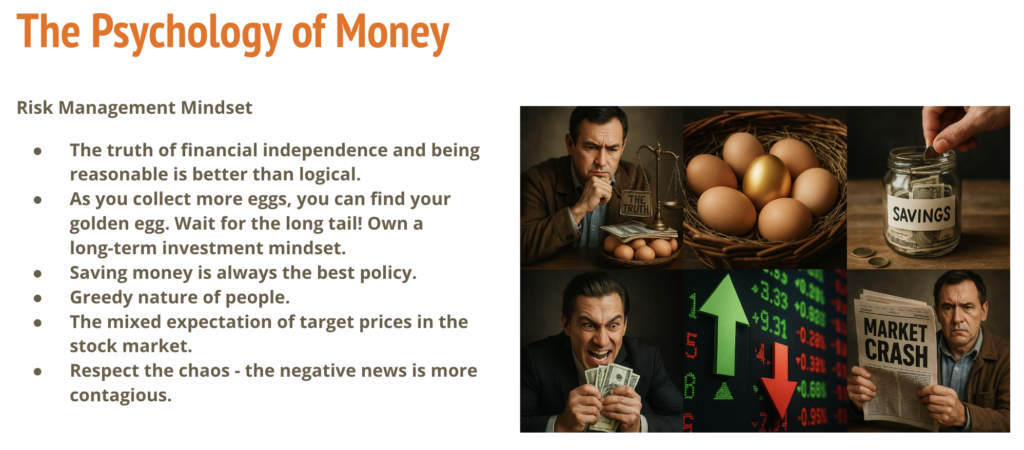Like the book Same as Ever, also written by Morgan Housel, The Psychology of Money is not a book to teach us how to make money but a book to help us develop a clear mindset and attitude toward money. Overall, I would comment that the book’s core value is risk management of money. Below, I extract six key takeaways from the book.

1. The truth of financial independence and being reasonable is better than being logical.
The pursuit of financial independence or freedom is to take our time back. Financial independence gives us more choices to plan what we want or what we can do. There are multiple ways to achieve this. Logically speaking, if an investment choice could accelerate our goals in financial independence but put us in high psychological pressure, would we choose this? Housel said he would not choose this option because financial independence, in essence, is to pursue happiness, and it does not make sense to sacrifice existing happiness to achieve financial independence. A plan could look logical but not reasonable. For me, I would say choose what is reasonable in a set of logical options.
2. As you collect more eggs, you can find your golden egg. Wait for the long tail! Own a long-term investment mindset.
The reward is not always contributed by each investment target but by a few investment targets. This does not mean that we can pick any target investment at random and get a successful result without any doubt. From my point of view, a robust investment strategy is not guaranteed to give us rewards immediately, but as we stick to it in the long run, statistically speaking, we will get the golden egg eventually. So, do not put everything in one egg, keep searching for good eggs, and do this in the long run, and to the end, we will get the golden egg that is more valuable than the rest of eggs.
3. Saving money is always the best policy.
Inflation can eat up our savings!? Yes, this is true. Once again, it is encouraged to save money but the key point is in what way. It is about risk management. The market is volatile, and we need to be aware of keeping a certain amount of savings to prepare for future uncertainty. Get away from unnecessary temptations and accumulate our savings in a solid plan.
4. The Greedy Nature of People
It is by nature that people tend to be tempted by greed. Many famous people are examples. Bernie Madoff’s Ponzi scheme is one example. Two reminders:
- Do not get tempted.
- Do not get cheated by those tempted. (“The Number Bias” is another book that could help us. )
5. Mixed expectation of target prices in the stock market.
One thing we have to realize is that, in a financial market such as a stock market, there are investors with different thoughts, plans, and expectations in their investing goals. Some investors are so competitive to earn money in millsecond-sacled trading and those who are more willing to stick to the long-run investment like a decade. The stock price is the combination of these expectations. In my opinion, a stock with more long-run investors builds a solid foundation to hold its bottom price while a stock with more short-term investors could fluctuate more in its prices. In this part, I am inspired to read the investors of the target stock.
6. Respect the chaos – negative news is more contagious.
Life is a journey of resolving various problems and challenges in chaos. I take a positive mindset over this point of view. Every time we resolve a problem or a challenge, we make our living environment or the world better. Regarding the negative news impact, I agree with its contagious impact. An economic growth news is not as powerful as an economic black swan news. I would say it is part of our genetic nature. Humans react more in danger compared to a safe environment. This genetic nature helped us survive in the old times.


